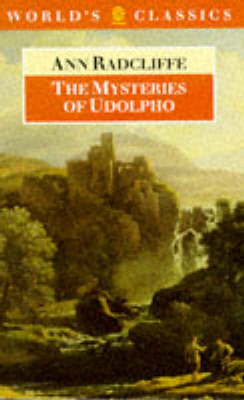Reviewed by Briana @ Pages Unbound on
The Mysteries of Udolpho has earned fame as the quintessential Gothic novel, full of all the essential elements and a must-read for fans of the genre. From a literary and historical standpoint, it undoubtedly is an interesting and important novel. In terms of entertainment, it falls a bit short. Personally, I found the action picked up the most 80% through the book, when major elements finally began to be revealed and some new action appeared, as well. The book contains a number of fascinating characters and plot points, but everything moves so slowly that an undetermined reader is at risk of simply giving up in favor of a more immediately rewarding book.
Though The Mysteries of Udolpho is horrifying in many respects (themes, scenes, imagery), the author also uses many tricks in order to build false suspense. For instance, protagonist Emily will be horrified by something she sees in an early chapter, then subsequently be too traumatized by the event to think on the subject again—so the reader never discovers what upset her so much until the very end of the book, where the author lays out a mass explanation of events. This way of writing may effectively keep readers wondering what all the mysteries of castle Udolpho are, but it ultimately feels like a cheap stunt.
Emily herself, though billed as something of the ideal woman of the time period, may also be frustrating for modern readers. She spends an exorbitant amount of pages fainting or weep, or, occasionally, striving not to faint or weep. (I suppose even she gets tired of it.) This melodrama is in keeping with the Gothic drama, but too much of it becomes boring, and, since it continuously stalls the plot as other characters have to interrupt real action to revive Emily, it comes across as another trick to keep information away from readers. So much time, for both the characters and the audience, could be saved if Emily could hold herself together for more than five pages and actually accomplish something.
Beyond my major issue with the length of the novel, however, I found few other problems and immensely enjoyed the Gothic elements when they arose. Readers are treated to deaths, ghosts, creepy castles with secret passages, murders, bandits, and more. Additional sensationalism comes not from these external elements, but from characters breaking societal standards. Emily, for instance, must run from overly aggressive suitors, and a lot of the fodder for the ghost stories is built around rumors of extramarital affairs.
The Mysteries of Udolpho also features a bit of romance, drawn out as long as every other plot element, but sweet nonetheless. The love interest is more complex than Emily and experiences an actual character arc as he falls from and then rises back into grace. I suppose there may be room for feminist discussion here: Is it fair that Emily must constantly be the model woman, while the man gets to lead a dissipate lifestyle but ultimately be forgiven? (Not that there are no terrible men and no terrible women in the story.) However, from an entertainment standpoint, I simply appreciated the fact that this guy has more personality than Emily, even if she is a very nice girl.
The Mysteries of Udolpho is an enjoyable read, due to its intrigue and its brief moments of fine action. It is not my favorite Gothic novel, however, in terms of plot. I found The Monk by Matthew Gregory Lewis, for instance, to be somewhat more hard-hitting. Readers already invested in the Gothic genre will probably find The Mysteries of Udolpho a worthwhile read, but anyone interested in it for casual entertainment may find it grindingly slow.
Reading updates
- Started reading
- 10 April, 2014: Finished reading
- 10 April, 2014: Reviewed
